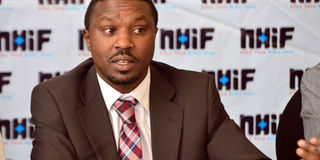NHIF urges cancer patients to take up medical scheme

National Hospital Insurance Fund chief executive officer Geoffrey Mwangi speaks about changes to healthcare access, at Crown Plaza Hotel, Nairobi, on November 2, 2017. Between July and December 2017, NHIF collected Sh23.6 billion from its seven million members. PHOTO | SALATON NJAU | NATION MEDIA GROUP
What you need to know:
- Mr Mwangi said said the national health insurer’s cover for chemotherapy is capped at Sh600,000 per beneficiary.
- NHIF data shows that there is a drop in claims for radiotherapy sessions from Sh220.3 million in 2016 to Sh196 million in 2017.
Cancer patients accessed chemotherapy and radiotherapy at a cost of Sh887 million paid for by the National Hospital Insurance Fund (NHIF) last year.
Under the latest NHIF cancer package introduced in 2015, patients are entitled to chemotherapy, radiotherapy, CT and MRI scans and monthly clinic check-ups.
Official records show chemotherapy accounted for Sh691 million, radiotherapy Sh196 million, MRI Sh667 million with the fund paying Sh368 million for CT scan claims in the last financial year.
Between July and December 2017, NHIF collected Sh23.6 billion from its seven million members and paid Sh17.3 billion to hospitals in claims.
The fund used Sh3.2 billion to cover its expenses, closing the year with a Sh3.1 billion surplus.
FINANCIAL SCHEME
NHIF data shows that there is a drop in claims for radiotherapy sessions from Sh220.3 million in 2016 to Sh196 million in 2017.
This, according to NHIF chief executive Geoffrey Mwangi, means less people are taking up the services.
“We are here to give people services and we are hoping that people will come for the services.
"To many, the scheme has proved helpful in relieving families of the burden of treating chronic diseases,” Mr Mwangi said.
The CEO said the national health insurer’s cover for chemotherapy is capped at Sh600,000 per beneficiary, covering six cycles, each administered monthly.
Radiotherapy cover is capped at Sh70,000 for 20 sessions.
This works out to a maximum of Sh3,500 per session.
TREATMENT
In 2015, NHIF introduced an outpatient cover and enhanced benefits for ailments such as cancer and kidney dialysis after raising the amount that workers contribute from Sh320 to a graduated monthly scale of between Sh500 and Sh1,700.
Mr Mwangi said NHIF has set up control measures to gradually enrol patients into the scheme.
“If a patient needs services like radiotherapy or chemotherapy, he or she must first seek pre-authorisation from the NHIF headquarters, which involves having a form filled in by the attending doctors specifying the therapy they require, total sessions needed and drugs before they can be treated,” he said.
But not all Kenyans can afford to make NHIF contributions.
NHIF MEMBERS
Ms Joy Makonzi, diagnosed with cervical cancer at stage four, needs Sh1.5 million to start chemotherapy but cannot raise it.
She has been forced to survive on painkillers as the fund cannot chip in because she is not a contributor.
“I really wanted to be a member but I cannot raise that Sh500 per month,” Ms Makonzi said, adding that if the amount could be reduced to Sh300 it would be affordable.
However, cancer treatment is increasingly becoming a challenge in the country as the burden of treating non-communicable disease mounts.
INSURANCE COVER
Private insurance companies provide patient cover to access treatment at affordable premiums deductible from salaries or business incomes.
Under both individual and corporate schemes, average cover limits range between Sh500,000 and Sh1 million.
According to Ms Mary Wanjiku, a member of the Minet Insurance’s Wellness Team, the underwriter caters for the insurance as well as psychosocial needs of their clients.
“In addition to catering for treatment costs, we link our patients to the various support groups like Faraja Trust, which counsels and educates them on how to live healthier, better quality lifestyles,” she said.
Ms Wanjiku said the premiums payable are subject to the type of cover the patient may opt for, adding that an individual is subject to tests before the client’s total premiums are determined.
COST
According to Mr David Makumi, the chairman of the Kenya National Cancer Organisations, an umbrella body of groups concerned with the treatment, counselling and support for cancer patients, cost is still a challenge.
“Even the NHIF cover has its limits for those remitting the Sh500 minimum contribution.
"It does not cover additional costs like paying the bill for treatments sourced abroad, except for the top civil service job groups and military,” he said.
A type of breast cancer that requires 18 doses of Herceptin, a drug costing up to Sh200,000 per dose, is an example of a disease not covered by NHIF’s ordinary cover, which is capped at Sh600,000.
“Even in cases of fully paid-up patients, we have seen some from far-flung areas give up on radiotherapy sessions, which take place five days a week simply because they lack a place to stay in Nairobi for the duration of the treatment,” Mr Makumi says.






